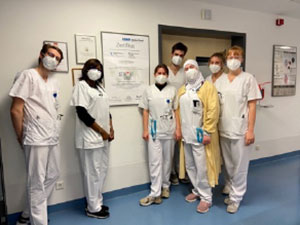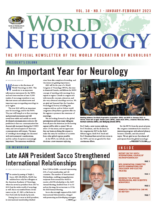By Prisca-Rolande Bassolé

Prisca-Rolande Bassolé
I am Dr. Prisca-Rolande Bassolé, neurologist from Dakar, Senegal. I would like to thank the World Federation of Neurology and the German Neurological Society for giving me this great opportunity to visit the department of neurology, Nov. 21-Dec. 16, 2022, at Universitätsklinikum Leipzig.
I was warmly welcomed since I arrived at the airport by Prof. Joseph Classen, department head, who introduced me to the staff the first day. He arranged weekly rotational visits for me.
Week 1: Stroke and neurointensive care unit
During my first week, I had the opportunity to attend the twice-daily rounds. I was able to observe the quality of the multidisciplinary medical and nursing care of patients who had undergone thrombolysis, who were awaiting further examinations or who were being investigated for the etiological diagnosis of acute paroxysmal neurological symptoms. I especially remember the clinico-electrophysiological management in the context of the diagnosis of a very acute onset of Guillain-Barre Syndrome, which was thus able to benefit from plasmapheresis.

Left to right: Prof. Joseph Classen (Head of Department), Prof. Petra Baum, Dr. Prisca-Rolande Bassolé, Prof. Dorothée Saur, Dr. Caroline Awiss, Dr. Daniela M. V. Kuenheim, and Dr. Christoph Mühlberg.
Week 2 and 4: Functional Diagnosis Unit
In my two-weeks of observation in this unit, I had the opportunity to observe Doppler and Duplex sonography of intra- and extra-cranial arteries. I also observed the exciting botulinum toxin injection sessions. I took part in the rewarding sessions of discussion and interpretation of neurophysiological tests (EP, EEG, EMG, and nerve conduction). I also attended consultation on movement disorders, and I had the great opportunity to attend a deep brain stimulation surgery. I particularly enjoyed my time in this unit. Prof. Petra Baum gives her time for each member of her team and is patient and didactic. Thanks to Prof. Baum and all members of her team (Daniela, Caroline, Clément, and Christoph).
Week 3: Emergency room (ER)
During my stay in the ER, I was particularly impressed by the implementation of the “Time is Brain” theory. I saw how acute stroke is managed from arrival to treatment with thrombolysis or thrombectomy. Neurologists and nurses in the ER are well organized and coordinated with the radiology and stroke units. I have also seen the management of other acute and paroxysmal neurological disorders. What really impressed me about this unit was the fluidity of information regarding the arrival of new patients and the resulting speed of care but also the higher age of patients with acute cerebrovascular events compared to my country. This is probably due to the youthfulness of our population and the negative lifestyle changes. I would like to thank Dr. Hannes, who despite the urgency of the place, found the time to explain each procedure to me.
I also had time to visit the city of Leipzig
This department visit program was a wonderful exchange of experiences and practices and an opportunity to create an academic network for future cooperation.
I will especially try to improve the practice of clinical neurophysiology in my department with all that I have learned. I will also try, with the support of the head of my department and all faculty members, to draw the attention of the political health authorities to the importance and necessity of setting up the conditions for acute stroke management.
Finally, I would like to thank Herwig-Landry who arranged my visit, and Mrs. Tetzlaff who helped me a lot with all administrative procedures during my stay.
Thanks to all the staff at Universitätsklinikum-Leipzig for their hospitality during my rotation at different units. •
Prisca-Rolande Bassolé is Associate Lecturer in Neurology at Fann Teaching Hospital in Dakar, Senegal.
